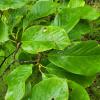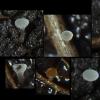
26-01-2026 11:49
Margot en Geert VullingsWe found this possible anamorph on a dead Cytisus

25-01-2026 23:23
Hello! I found this species that resembles Delitsc

18-01-2026 12:24
Hello.An anamorph located on the surface of a thin

23-01-2026 21:50
Cameron DKI am looking for this please publication. is anyon

10-01-2026 20:00
Tom SchrierHi all,We found picnidia on Protoparmeliopsis mur

21-01-2026 16:32
Gernot FriebesHi,I need your help with some black dots on a lich

21-01-2026 16:48
Gernot FriebesHi,after my last unknown hyphomycete on this subst

20-01-2026 17:49
 Hardware Tony
Hardware Tony
I offer this collection as a possibility only as e
Possible Allophylaria nervicola on leaves of Magnolia
B Shelbourne,
25-10-2024 02:15
• The paraphysis VBs seem to suggest Pezizellaceae, and with the marginal hairs then possibly something close to Calycina.
• It seems Calycina has considerable size and variation, and some groups do have similar macro.
• I looked at some white species with aseptate spores on leaves, e.g. C. populina and C. subcitrina, but none seem to match.
• While looking at other genera for inspiration, I noticed Allophylaria, and A. nervicola seems similar.
Habitat: On the underside of slow decaying leaves of a cultivated deciduous tree (epiphyllous), possibly Magnolia acuminata, often on the veins, some leaves with only the veins remaining, wet when found, on the floor, amongst leaf litter, on the surface or lightly buried, under a nearby tree but not seen on the other leaves, private garden, High Weald, south England, after rain.
Associates: Some whitish-translucent, sessile, long-haired apothecia on one of the leaves, no micro.
Apothecia: < ~1 x 0.5 mm, whitish, stipitate, loosely gregarious.
Low magnification: Cupulate to discoid, stipe often relatively long, obconical to narrow-cylindrical, disc convex then plane, eventually plano-concave, receptacle becoming more whitish to pale yellowish/chlorinaceous, disc with gelatinous and uneven appearance, margin indistinct, stipe translucent with smooth-gelatinous appearance, orangish-brownish at base, superficial, apparently all becoming orange-brown when overmature.
Asci: Cylindrical clavate, croziers, rings rb, mostly very dirty pre-KOH, possibly Calycina type, looks like Allophylaria in Baral (1987), apex rounded and 2-2.5-seriate when turgid, subtruncate when flaccid with relatively narrow thickening, apparently remaining everted after discharge, retaining some reactive material.
Spores: Broadly ellipsoid-cylindrical, ends rounded, approximately homopolar but often a more elongated base can be recognised, a group of small to medium LBs towards each end, usually one larger one and many small ones around it (sometimes appearing biguttulate), some seen in IKI with detaching hyaline sheath, only immature spores?
Free spores in water and in mature asci:
(11.8) 12.0-14.5 (16.1) × 4.0-4.6 (4.8) µm, Q = (2.6) 2.8 - 3.3 (3.6), N = 15, Me = 13.3 × 4.4 µm, Qe = 3.1.
Paraphyses: Cylindrical, apex gradually medium inflated, large cylindrical pale chlorinaceous VBs at the apex, seem to be somewhat agglutinated at the apices with a thin hyaline-chlorinaceous exudate, strong dextrinoid reaction from VBs, then golden with KOH.
Medullary: Text. porrecta-intricata, also appears gelatinsed, irregularity from medullary continues somewhat down the centre of the stipe, no horizontal hyphae observed.
Ectal: Textura prismatica, gelatinised, hyaline but pale chlorinaceous at lower magnification, slightly darker around the receptacle, some cells with a few globose low refractive guttules, at the base of the stipe smaller cells and more globose, some small knob-like protrusion on the stipe but no hairs, patchy dextrinoid reaction throughout.
Marginal hairs: Short, ~2-3 septa protruding, narrowing towards the apex, apices uninflated to rarely clavate-capitate?, apparently with chlorinaceous contents like paraphyses.
Hans-Otto Baral,
25-10-2024 21:25

Re : Possible Allophylaria nervicola on leaves of Magnolia
Hi Ben
yes it is! This is a rather frequent species, and I wonder why it is not more often presented. Perhaps it is neglected as a possible Hymenoscyphus, especially when neglecting the apicla ring shape.
I feel a bit unwell when I recommend again to try a sequence, but in this case it is actually since a long tim that I am longing for DNA data. There are so far only three sequences in the genus, 1x A. subliciformis (in GenBank) and 2x A. macrospora (not in GenBank), which are not close and cluster differently (the former with Calycina citrina, the latter more with Calycellina).
Zotto
B Shelbourne,
27-10-2024 20:23
Re : Possible Allophylaria nervicola on leaves of Magnolia
Thank you. I think I understand more about the historic confusion between Cyathicula and Crocicreas now.
Those (ITS?) results do sound interesting. Morphologically, I considered this species nearer to Calycina than Calycellina, based mostly on the marginal cells.
Those (ITS?) results do sound interesting. Morphologically, I considered this species nearer to Calycina than Calycellina, based mostly on the marginal cells.
Hans-Otto Baral,
27-10-2024 21:45

Re : Possible Allophylaria nervicola on leaves of Magnolia
ITS+LSU. I also assume that A. nervicola will cluster more probably with A. subliciformis. But phylotrees are sometimes full of surprizes.


 Section-2-0001.jpeg
Section-2-0001.jpeg